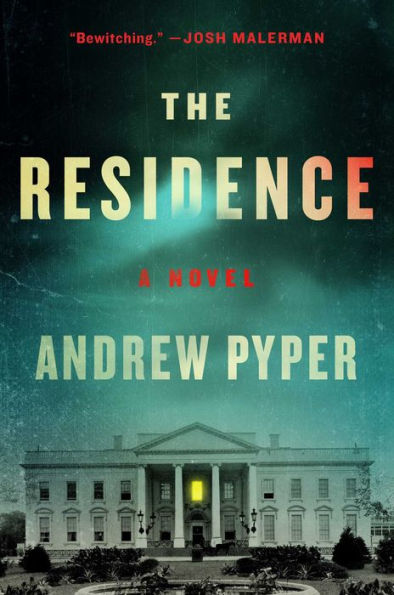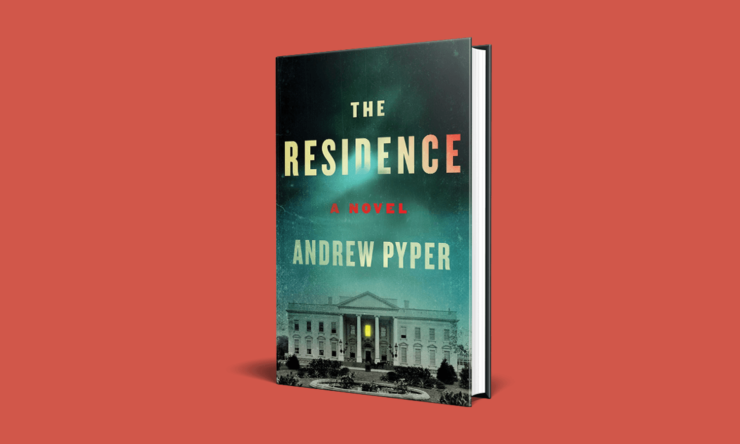A divided nation. An American president deals with the death of his 11-year-old child. The First Lady seeks solace in séances and mediums. The year is not 1862, and the president is not Abraham Lincoln. Rather, The Residence tells the story of the eclipsed and tragic figure of Franklin Pierce, a caretaker president whose attempts to find a compromise to the slavery issue only drove his young nation closer to fratricide. It is equally the story of his haunted, occultist wife, a woman who wears the hair of two dead sons in a locket.
There is tragedy enough to mine in this story without invoking the supernatural, but Andrew Pyper, author of 2013’s excellent The Demonologist, is never a man to resist a whiff of brimstone.
This book opens with the January, 1853 train wreck that killed Bennie Pierce just before his father’s inauguration. That the boy was the sole fatality in the accident must have seemed to the grieving parents a deliberate cruelty on the part of God; that, or a machination of something malign. In this retelling, the malign is introduced straightaway as the dead boy in the train serves as a vessel for something else, something that tells the mother YOU WILL LET ME IN.
Pyper holds little back in the beginning of The Residence; on the day the president and his wife move in to the White House, we learn that the man who cares for the furnace won’t approach it while the spirits of the dead congregate around it. The wife’s childhood invocation of the dread entity we will come to know as Sir is revealed early on.
Buy the Book


The Residence
It is a risky thing in horror to show so much so soon. Epee fencers will know of an attack called a flèche, or ‘arrow,’ where the arm is extended, the body leans, and the sword is run straight at the defender–it is a move without artifice. “Here it comes, NOW! What are you going to do about it?” Pyper’s style is just so aggressive here, displaying his weapons early and daring us not to be struck by them.
That the gambit is largely successful owes much to Pyper’s craftsmanship. His horrors are well-constructed; they find ready anchors in the historical details he provides, and strong engines in the prose Pyper wields. Beautiful prose is the calling card of any Pyper novel, and it is on full display here. After Franklin Pierce swears his oath of office–not on a bible, but on a law book–the applause comes as “a sparse thudding of gloved hands, voiceless and brief. It sounded to him like spades biting frozen soil.”
Though the dramatic tension is tempered by our knowledge that the President and First Lady will survive their ordeal, The Residence has moments of real dread. Jane’s childhood discovery of a pendulum game–a divination tool something like a Ouija board–will send gooseflesh up most readers’ necks. One scene with a tin soldier may make even the sturdiest horror fans nostalgic for Tobe Hooper’s Poltergeist, where animated toys merely strangle their victims.
Strong characterization also fuels the narrative. While Franklin Pierce himself at times seems a bit wooden, his wife, Jane, is a much more interesting specimen. Their courtship, revealed in flashback, shows us something of the impishness and mischief of her spirit. Jane is transgressive, curious, out-of-the-ordinary, and she draws secular Franklin in like a bird to birdlime. When he compares her to a fallen angel, Jane says “Now that, sir, is flattery.” In Pyper’s Dantean cosmology, these two will be easy prey for the forces that use them to gain entrée to the halls of power.
The Residence does good work in its study of grief, as well. Mrs. Pierce’s habit of writing letters to her dead boy, her insistence on keeping a room furnished for him, her inability to accompany her husband on state occasions, are grounded in fact and touchingly represented. That the Pierces lost Bennie’s older brother to fever years before only prepared the ground for the crowning insult of the train wreck, an event that sealed the couple’s lives in tragedy. There will be no filling the hole left by a brace of dead sons, not even for a president and his wife.
Of course, the timing of this 2020 novel about diabolical powers lurking in the halls of government and civil conflict waiting in the wings seems unlikely to be accidental. As a Canadian, Mr. Pyper is likely moved by a sense of sympathy and dread, watching the paroxysms of his southern neighbors struggling with factionalism and polarization unseen since the days of the Pierce presidency. His assessment of the American brand, delivered near the novel’s satisfying conclusion, is harsh, but perhaps not unearned:
“…at the very heart of America, there lives a darkness. Material and intelligent and alive. One that would…sculpt the country in ways that, over time, might not be recognized as darkness at all.”
In The Residence, Pyper gives us not only an effective and engaging historical horror novel; but a fable that does us the compliment of assigning some portion of the blame for the darker parts of American history to forces beyond our control.
The Residence is available from Skybound Books.
Christopher Buehlman is the winner of the 2007 Bridport Prize for Poetry and the author of several plays and five novels: The Suicide Motor Club, The Lesser Dead (named the American Library Association’s Best Horror Novel of the Year), The Necromancer’s House, Between Two Fires, and Those Across the River (a World Fantasy Award nominee for best novel).










